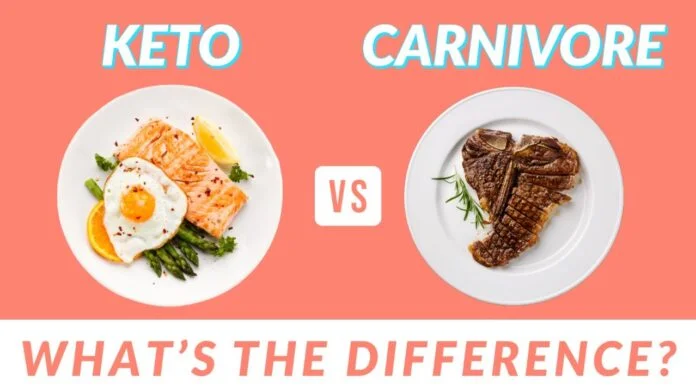When it comes to weight loss, the diet landscape is vast and varied. Among the popular options, the ketogenic diet (keto) and carnivore diet have gained significant attention. In this blog post, we will compare and contrast these two approaches, examining their effectiveness, health implications, and sustainability to determine which may be more suitable for weight loss. What is better? Keto or Carnivore.
1. Understanding the Ketogenic Diet:
The ketogenic diet is a low-carbohydrate, high-fat eating plan designed to induce a metabolic state called ketosis. By drastically reducing carbohydrate intake, the body is forced to utilize stored fat for energy, resulting in weight loss.
This diet primarily consists of healthy fats, moderate protein, and very low carbohydrate intake, typically below 50 grams per day. By doing so, the body efficiently burns fat as its primary fuel source.
2. Unveiling the Carnivore Diet:
In stark contrast to keto, the carnivore diet is an extremely low-carb, high-protein regimen that focuses solely on animal-based foods. It emphasizes meat, fish, eggs, and limited dairy products, while excluding all plant-based foods, including fruits, vegetables, and grains.
Supporters argue that consuming a diet rich in animal protein and fat leads to weight loss and improved overall health due to increased satiety and reduced insulin response.
3. Effectiveness for Weight Loss:
Both the ketogenic and carnivore diets can be effective for weight loss, but the underlying mechanisms differ. Keto’s success lies in the body’s transition into ketosis, which increases fat burning and reduces appetite. This metabolic shift can lead to sustainable weight loss over time.
On the other hand, the carnivore diet’s weight loss benefits may be attributed to the elimination of processed and high-sugar foods, resulting in overall calorie reduction. However, the long-term health implications of relying solely on animal-based foods are a subject of debate.
4. Health Implications and Nutritional Adequacy:
While the ketogenic diet promotes a balance of healthy fats, moderate protein, and low-carbohydrate intake, it allows for a wider variety of nutrient-dense foods, including non-starchy vegetables and certain fruits. This diversity offers a broader range of essential vitamins, minerals, and fiber that contribute to overall health and well-being.
In contrast, the carnivore diet eliminates these plant-based sources of nutrients, potentially leading to micronutrient deficiencies, particularly fiber and certain vitamins.
5. Sustainability and Long-Term Adherence:
The sustainability of any weight loss approach is essential for long-term success. The ketogenic diet offers more flexibility, allowing for a wider range of food choices and the potential for greater dietary adherence.
In contrast, the carnivore diet’s restrictive nature and limited food variety may lead to boredom and difficulty adhering to the plan over time. This lack of variety can also impact social interactions and make it challenging to follow in the long run.
6. Unveiling the Carnivore Diet: An Animal-Based Approach:
In stark contrast to keto, the carnivore diet is an extremely low-carbohydrate, high-protein regimen that exclusively focuses on animal-based foods.
The diet primarily comprises meat, fish, eggs, and limited dairy products, while entirely eliminating plant-based foods such as fruits, vegetables, and grains. Advocates argue that the high animal protein and fat content promotes weight loss through increased satiety and reduced insulin response.
7. Effectiveness for Weight Loss: Diverse Approaches:
Both the ketogenic and carnivore diets have shown promise for weight loss, albeit through different mechanisms. Keto’s effectiveness lies in its ability to induce ketosis, stimulating fat burning and reducing appetite, ultimately leading to sustainable weight loss. Conversely, the weight loss benefits of the carnivore diet may stem from eliminating processed and high-sugar foods, resulting in overall calorie reduction. However, the long-term health implications of relying solely on animal-based foods are a matter of contention.
8. Health Implications and Nutritional Adequacy: Striking a Balance:
While the ketogenic diet encourages a balance of healthy fats, moderate protein, and limited carbohydrate intake, it permits a wider array of nutrient-dense foods, including non-starchy vegetables and select fruits.
This dietary diversity provides a broader spectrum of essential vitamins, minerals, and fiber that contribute to overall health and well-being. In contrast, the carnivore diet eliminates these plant-based sources of nutrients, potentially leading to deficiencies in micronutrients like fiber and certain vitamins.
9. Sustainability and Long-Term Adherence: Beyond Short-Term Results:
Sustainability is a crucial factor for long-term success in any weight loss endeavor. The ketogenic diet offers greater flexibility, allowing for a wider range of food choices and potentially fostering better dietary adherence.
Conversely, the carnivore diet’s restrictive nature and limited food variety may lead to monotony and challenges in adhering to the plan over time. This lack of variety can also impact social interactions and make long-term compliance difficult.
Conclusion:
In the battle between keto and carnivore for weight loss supremacy, it ultimately depends on personal preference and individual health considerations.
While both diets have the potential to promote weight loss, the ketogenic diet seems to offer a more balanced approach that ensures adequate nutrient intake and long-term adherence. It’s important to consult with a healthcare professional before embarking on any dietary change. To ensure it aligns with your specific needs and goals.

